|
Peter Drucker: Conceptual Resources
about Peter Drucker — a political - social ecologist
The Über Mentor
Remembering Peter Drucker
from the November 2009 issue of The Economist
Top of the “food chain”
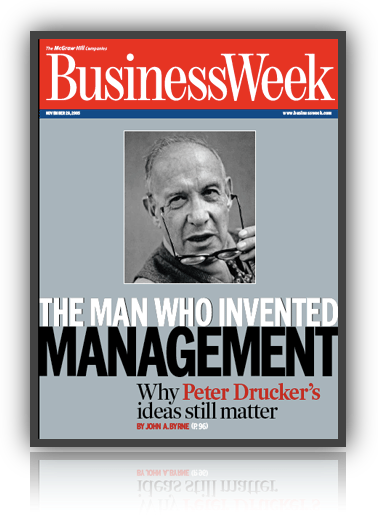
A social ecologist
(a different way of thinking
— lead to his top-of-the-food-chain reputation)
“To know something,
to really understand something important,
one must look at it from sixteen different angles.
People are perceptually slow,
and there is no shortcut to understanding;
it takes a great deal of time.” read more
Drucker is the antidote to the flood of bad advice
spewed from tunnel vision experts lacking an awareness of “world dynamics.”
Have they actually tested their advice in a changing world?
Why Peter Drucker Distrusted Facts (HBR blog)
“He had an unparalleled grasp of the big picture”
— Bob Buford
“The more we dug into the formative stages and inflection points of companies like
General Electric, Johnson & Johnson, Procter & Gamble, Hewlett-Packard,
Merck and Motorola, the more we saw Drucker’s intellectual fingerprints.
David Packard’s notes and speeches from the foundation years at HP
so mirrored Drucker’s writings that I conjured an image of Packard
giving management sermons with a classic Drucker text in hand … ”
— Jim Collins author of Built to Last, Good to Great, and How the Mighty Fall
“No human being has built a better brand
by just managing himself”
Harvard Business Review
Google web search Peter Drucker
Google rlaexp.com site search Peter Drucker

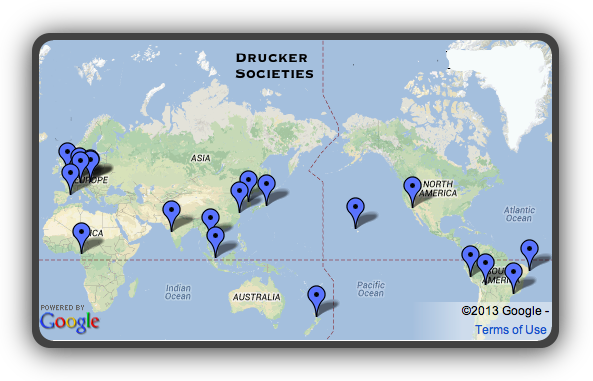
“I am not a ‘theoretician’; through my consulting practice I am in daily touch with the concrete opportunities and problems of a fairly large number of institutions, foremost among them businesses but also hospitals, government agencies and public-service institutions such as museums and universities.
And I am working with such institutions on several continents: North America, including Canada and Mexico; Latin America; Europe; Japan and South East Asia.” — PFD
Drucker wrote several kinds of books that together create a more complete worldview. They are valuable attention directing tools. How else could your brain explore?
 The comprehensive management books provide a structural and conceptual framework. The comprehensive management books provide a structural and conceptual framework.
 The time related management books add dimensions, depth, and details. The time related management books add dimensions, depth, and details.
 The toward tomorrows and essay collections provide a backdrop of insight into situations, backgrounds, and settings in which management has an opportunity to go after results and performance. The toward tomorrows and essay collections provide a backdrop of insight into situations, backgrounds, and settings in which management has an opportunity to go after results and performance.
Even the older brainscapes are useful for figuring out how he saw these things and where he looked.
Dense reading and Dense listening and Thinking broad and Thinking detailed
The human the brain has no natural way to bring itself to focus on the real tomorrows. His work may help.


Topic areas
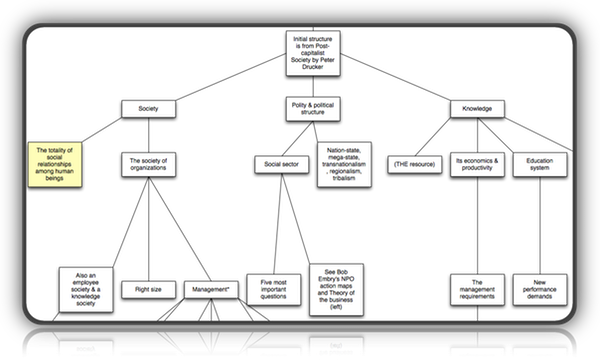
Larger

Combined outline of Drucker's books — useful for topic searching.
Process: find topic; get Kindle version; word search; dictate notes to voice recognition software (Dragon NS or smart phone); calendarize — work something out in time.
Drucker’s Career Timeline And Bibliography
Invent Radium or I'll Pull Your Hair by Doris Drucker
Most of the following contain interesting introductions and prefaces with key strategic concepts. Reading through a book's index is a valuable use of time.

Categories
Toward tomorrows (just below)
Comprehensive Management Books
Time Related Management Books
For individuals
Books about Drucker and his ideas
Drucker Essay Collections
Drucker Foundation

Toward tomorrows

Toward unimagined futures
 The End of Economic Man: The Origins of Totalitarianism (1939) There’s still lots to learn here!!!! The End of Economic Man: The Origins of Totalitarianism (1939) There’s still lots to learn here!!!!
 The Future of Industrial Man (1943) The Future of Industrial Man (1943)
 The New Society: The Anatomy of Industrial Order (1950) The New Society: The Anatomy of Industrial Order (1950)
 Landmarks of Tomorrow (1957) Landmarks of Tomorrow (1957)
 The Age of Discontinuity (1968) The Age of Discontinuity (1968)
 The New Realities (1988) The New Realities (1988)
 Post-Capitalist Society (1993) Post-Capitalist Society (1993)
 Managing in the Next Society (2002); Last section originally published earlier in The Economist (http://economist.com/surveys/displaystory.cfm?story_id=770819) Managing in the Next Society (2002); Last section originally published earlier in The Economist (http://economist.com/surveys/displaystory.cfm?story_id=770819)

Comprehensive Management Books
About management
 Concept of the Corporation Concept of the Corporation
 Practice of Management Practice of Management
 Managing for Results Managing for Results
 Management: Tasks, Responsibilities, Practices Management: Tasks, Responsibilities, Practices
 Innovation and Entrepreneurship Innovation and Entrepreneurship
 The Essential Drucker — An “introduction” to management for … The Essential Drucker — An “introduction” to management for …
… But he—rightly—saw that the U.S. and U.K. (and probably altogether the Western) audience for such a work would be both broader and narrower than the audience for the Japanese venture.
It would be broader because there is in the West a growing number of people who, while not themselves executives, have come to see management as an area of public interest; there are also an increasing number of students in colleges and universities who, while not necessarily management students, see an understanding of management as part of a general education; and, finally, there are a large and rapidly growing number of mid-career managers and professionals who are flocking to advanced-executive programs, both in universities and in their employing organizations.
The focus would, however, also be narrower because these additional audiences need and want less an introduction to, and overview of, Drucker's work than they want a concise, comprehensive, and sharply focused Introduction to Management, and to management alone. …
 Peter Drucker on the Profession of Management (a collection of articles published in HBR) Peter Drucker on the Profession of Management (a collection of articles published in HBR)
 The future that has already happened The future that has already happened
 Managing the Non-Profit Organization Managing the Non-Profit Organization
 Management, Revised Edition Management, Revised Edition
 Management Cases (Revised Edition) Management Cases (Revised Edition)
 The Five Most Important Questions You Will Ever Ask About Your Organization The Five Most Important Questions You Will Ever Ask About Your Organization

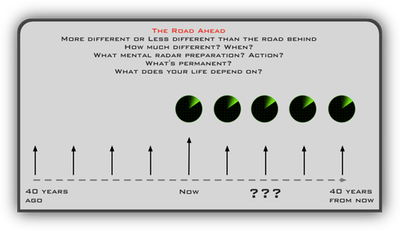
“Time Related” Management Books
Important ways to “see” otherwise invisible aspects of reality and to relocate one's brain to unfamiliar territory.
Some of the chapter topics have made their way into The Daily Drucker
The subtopics below selected book titles are not the entire contents that book.
 Managing in Turbulent Times Managing in Turbulent Times
 Toward the Next Economics and Other Essays Toward the Next Economics and Other Essays
 The Changing World of The Executive The Changing World of The Executive
 A Scorecard for Management A Scorecard for Management
… “bottom line” is not even an appropriate measure of management performance
 Performance in Appropriating Capital Performance in Appropriating Capital
 Performance on People Decisions Performance on People Decisions
 Innovation Performance Innovation Performance
 Planning Performance (reality vs. expectations) Planning Performance (reality vs. expectations)
 Learning From Foreign Management Learning From Foreign Management
 Demand responsibility from their employees Demand responsibility from their employees
 Thought through their benefits policies more carefully Thought through their benefits policies more carefully
 Take marketing seriously — knowing what is value for the customer Take marketing seriously — knowing what is value for the customer
 Base their marketing and innovation strategies on the systematic and purposeful abandonment Base their marketing and innovation strategies on the systematic and purposeful abandonment
 Longer-term investment or opportunities budgets Longer-term investment or opportunities budgets
 Leaders responsible for the development of proper policies in the national interest Leaders responsible for the development of proper policies in the national interest
 Aftermath of a Go-Go Decade Aftermath of a Go-Go Decade
 Managing Capital Productivity Managing Capital Productivity
 Measuring Business Performance Measuring Business Performance
Performance in a business means applying capital productively and there is only one appropriate yardstick of business performance: return on all assets employed or on all capital invested
 Good Growth and Bad Growth Good Growth and Bad Growth
 Managing the Knowledge Worker Managing the Knowledge Worker
 Frontiers of Management Frontiers of Management
 Measuring White Collar Productivity Measuring White Collar Productivity
 Getting Control of Staff Work Getting Control of Staff Work
 Slimming Management’s Midriff Slimming Management’s Midriff
 The No-Growth Enterprise The No-Growth Enterprise
 Why Automation Pays Off Why Automation Pays Off
 Managing for the Future Managing for the Future
 The New Productivity Challenge The New Productivity Challenge
 Manage by walking around — Outside! Manage by walking around — Outside!
 Permanent cost cutting: permanent policy Permanent cost cutting: permanent policy
 Four marketing lessons for the future Four marketing lessons for the future
 Company performance: five telltale tests Company performance: five telltale tests
 Market standing Market standing
 Innovative performance Innovative performance
 Productivity Productivity
 Liquidity and Cash Flows Liquidity and Cash Flows
 Profitability Profitability
 No Precise Readings No Precise Readings
 The trend toward alliances for progress The trend toward alliances for progress
 The emerging theory of manufacturing The emerging theory of manufacturing
 Sell the Mailroom. Unbundling in the ‘90s Sell the Mailroom. Unbundling in the ‘90s
 Managing in a Time of Great Change Managing in a Time of Great Change
 The theory of the business The theory of the business
 Planning for uncertainty Planning for uncertainty
 The five deadly business sins The five deadly business sins
 Management Challenges for the 21st Century Management Challenges for the 21st Century
 Managing in the Next Society Managing in the Next Society

Landscape intel updates
How have things changed since the original was written?
And who will work on each of these — now and tomorrow?
What’s the information?
 What New Institutions Can be Seen? What New Institutions Can be Seen?
The topics below are chapter title examples extracted from Drucker’s work. Additional topics can unearthed by more detailed analysis
 Trade Lessons from the World Economy Trade Lessons from the World Economy
 Where the New Markets Are Where the New Markets Are
 The Pacific Rim and the World Economy The Pacific Rim and the World Economy
 China’s Growth Markets China’s Growth Markets
 The New Superpower. The Overseas Chinese The New Superpower. The Overseas Chinese
 Can the Democracies Win the Peace? Can the Democracies Win the Peace?
 The Transnational Economy The Transnational Economy
 The Futures Already Around Us The Futures Already Around Us
 From World Trade to World Investment From World Trade to World Investment
 The Lessons of the US Export Boom The Lessons of the US Export Boom
 Low Wages. No Longer a Competitive Edge Low Wages. No Longer a Competitive Edge
 Help Latin America and Help Ourselves Help Latin America and Help Ourselves
 Mexico’s Ace in the Hole. The Maquiladora Mexico’s Ace in the Hole. The Maquiladora

Individually Aimed Books by Drucker
 Managing Oneself Managing Oneself
 The Effective Executive The Effective Executive
 The Effective Executive in Action The Effective Executive in Action
 The Executive in Action: Three Drucker Management Books on What to Do and Why and How to Do It The Executive in Action: Three Drucker Management Books on What to Do and Why and How to Do It
Managing for Results, Innovation and Entrepreneurship, and The Effective Executive with a new preface by the author
 What Executives Should Remember (a valuable summary of several core concepts) What Executives Should Remember (a valuable summary of several core concepts)
 The Daily Drucker (an introduction to broad range of his thoughts) The Daily Drucker (an introduction to broad range of his thoughts)
The Daily Drucker table of contents worksheet
 Drucker on Asia — A Dialogue Between Peter Drucker and Isao Nakauchi Drucker on Asia — A Dialogue Between Peter Drucker and Isao Nakauchi
 Adventures of a Bystander Adventures of a Bystander
Books about Drucker and his ideas
 Drucker and Me by Bob Buford Drucker and Me by Bob Buford
 The Definitive Drucker The Definitive Drucker
 Inside Drucker's Brain Inside Drucker's Brain
 A Class With Drucker: The Lost Lessons of the World's Greatest Management Teacher A Class With Drucker: The Lost Lessons of the World's Greatest Management Teacher
 Drucker on Leadership: New Lessons from the Father of Modern Management Drucker on Leadership: New Lessons from the Father of Modern Management
 The Drucker Lectures: Essential Lessons on Management, Society, and Economy The Drucker Lectures: Essential Lessons on Management, Society, and Economy
 The Drucker Difference The Drucker Difference
 Drucker's Lost Art of Management: Peter Drucker’s Timeless Vision for Building Effective Organizations Drucker's Lost Art of Management: Peter Drucker’s Timeless Vision for Building Effective Organizations
 Drucker: A Life in Pictures Drucker: A Life in Pictures

Drucker Essay Collections
Although written years ago, these essays can be valuable attention directing tools. They can take your brain to places (brain addresses and brain roads) it wouldn't naturally go. What has changed and what is likely to change?
 Technology, Management and Society Technology, Management and Society
 Men, Ideas & Politics Men, Ideas & Politics
 Toward the Next Economics and Other Essays Toward the Next Economics and Other Essays
 The Ecological Vision: Reflections on the American Condition The Ecological Vision: Reflections on the American Condition
 A Functioning Society: Selections from Sixty-Five Years of Writing on Community, Society, and Polity A Functioning Society: Selections from Sixty-Five Years of Writing on Community, Society, and Polity
The Drucker Foundation — aka Frances Hesselbein Leadership Institute
 The Leader of the Future The Leader of the Future
 The Leader of the Future 2 The Leader of the Future 2
 The Organization of the Future The Organization of the Future
 The Community of the Future The Community of the Future

“Rarely in human history has any institution emerged as quickly
as management or had as great an impact so fast.
In less than 150 years, management has transformed
the social and economic fabric of the world’s developed countries.
It has created a global economy and set new rules for countries
that would participate in that economy as equals.
And it has itself been transformed.
Few executives are aware of the tremendous impact
management has had” … more
“High tech is living in the nineteenth century, the pre-management world. They believe that people pay for technology. They have a romance with technology. But people don't pay for technology: they pay for what they get out of technology.” — The Frontiers of Management
“Management, that is, the “useful knowledge” that enables man for the first time to render productive people of different skills and knowledge working together in an “organization,” is an innovation of this century. It has converted modern society into something brand new, something, by the way, for which we have neither political nor social theory: a society of organizations.” — Innovation and Entrepreneurship
There is no point in asking which came first: the educational explosion of the last hundred years or the management that put this knowledge to productive use.
Modern management and modern enterprise could not exist without the knowledge base that developed societies have built.
But equally it is management, and management alone, that makes effective all this knowledge and these knowledgeable people.
The emergence of management has converted knowledge from social ornament and luxury into the true capital of any economy.
The function of organizations is to make knowledges productive.
Organizations have become central to society in all developed countries because of the shift from knowledge to knowledges.
He’s not talking about your job today …
“That knowledge has become the resource,
rather than a resource,
is what makes our society “post-capitalist.”
This fact changes—fundamentally—the structure of society.
It creates new social and economic dynamics.
It creates new politics.
The post-capitalist society
is both a knowledge society and a society of organizations,
each dependent on the other and yet
each very different in its concepts, views, and values.
It is the very nature of knowledge
that it changes fast
and that today’s certainties
will be tomorrow’s absurdities.” — PFD
“AS WE ADVANCE deeper into the knowledge economy, the basic assumptions underlying much of what is taught and practiced in the name of management are hopelessly out of date.
They no longer fit reality.” — Management’s New Paradigms
“The productivity of knowledge is going to be the determining factor
in the competitive position of a company, an industry, an entire country.
No country, industry, or company has any “natural” advantage or disadvantage.
The only advantage it can possess is the ability to exploit universally available knowledge.
The only thing that increasingly will matter
in national as in international economics
is management’s performance in making knowledge productive.”
— Knowledge: Its Economics and Productivity
Managing Oneself contains the following:
Successful careers are not planned.
They develop when people are prepared for opportunities because they know their strengths, their method of work, and their values.
Knowing where one belongs can transform an ordinary person—hardworking and competent but otherwise mediocre—into an outstanding performer.
… And we will have to stay mentally alert and engaged during a 50-year working life, which means knowing how and when to change the work we do.
More here
Managing Oneself is a REVOLUTION in human affairs.
It requires new and unprecedented things from the individual, and especially from the knowledge worker.
For in effect it demands that each knowledge worker THINK and BEHAVE as a Chief Executive Officer.
It also requires an almost 180-degree change in the knowledge workers’ thoughts and actions from what most of us—even of the younger generation—still take for granted as the way to think and the way to act.

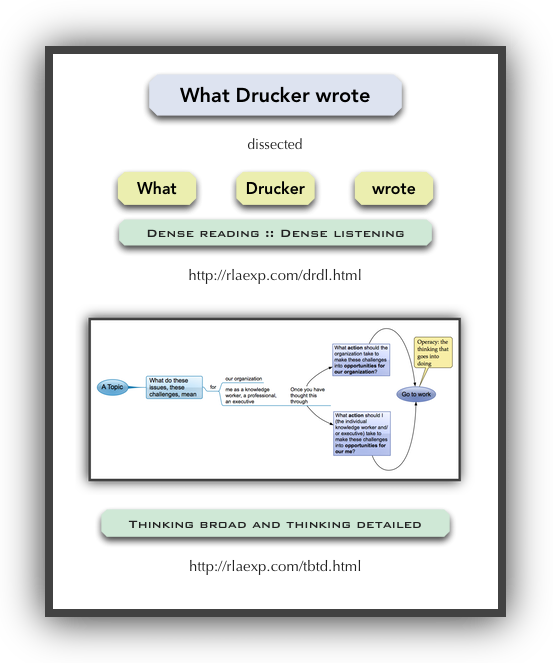
What do these … mean? An opportunity

Following illustrations suggest a conceptual processing system
Keywords: tlnkwdruckerbooks
|
![]()
